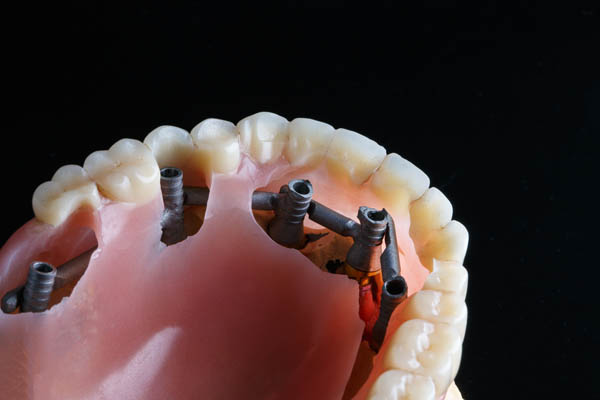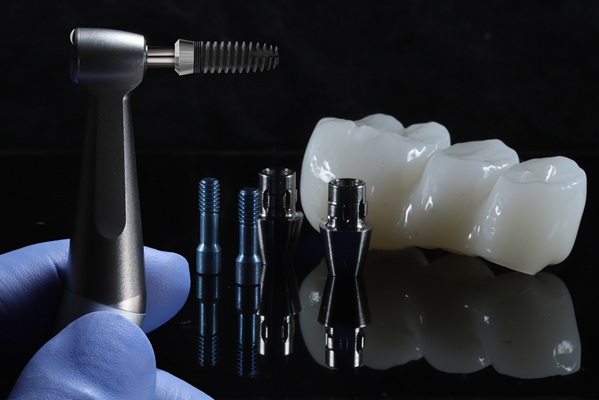How Long Does the Procedure for Implant Supported Dentures Take?

Implant supported dentures are a popular tooth replacement treatment option that combines dental implants and dentures. Because they combine two already existing treatments, individuals tend to experience extremely positive results, meaning little to no failure and full functionality of the oral cavity.
When considering implant-supported dentures, a popular question that arises is how long the procedure takes. Continue reading to find out! This information may be helpful to someone considering different tooth replacement options.
Implant-supported dentures: the timeline
Below is an overview of how long an implant-supported dentures procedure takes. It is also good to know that there are a few steps involved in the entire process.
The placement procedure
Getting implant-supported dentures does require a few steps, with the first being the placement of the dental implants. Dental implant placement requires a minimally-invasive procedure. On average, the patient should expect this procedure to take anywhere from 90 minutes to two hours, depending on the number of implants placed and how viable the jawbone is.
In some instances, the placement procedure may not be the first step. Some individuals may not have enough viable jawbone, meaning there is not enough density for implants to live. In this case, an additional step would be required to allow for a bone graft to take place. This procedure may take a couple of hours as there are two steps, with the first being removal of bone from somewhere else in the body, and the second being the actual placement in the jaw. After the bone graft, there will be a few weeks of healing. Once enough bone is added to the jaw, the dental implants can be successfully placed.
Afterward
After the dental implants are placed, there is a period of healing required. Unlike other procedures, dental implants do take up to a few months to properly heal. This is because the bone has to accept the implant and allow for fusing to take place. Fusing is referred to as osseointegration and it is a crucial step in the implant-supported dentures process.
In the particular case of implant-supported dentures, osseointegration may take up to three to four months. The length of time depends on the patient's ability to heal, as well as the number of implants placed, which in this case, would most likely be four to six.
Once the dental implants have fully fused, the patient will return to the dentist to be fitted for the dentures, which can take a couple of weeks to get back from the dental lab. Finally, the dentures will be attached to the dental implants via abutments, which are small metal connectors.
Find out more
When considering tooth replacement with implant-supported dentures, it is highly advised to consult with a dentist. Not everyone is a good candidate for the procedure, which is why a full evaluation will be necessary. During the evaluation, the dentist can answer questions and address concerns about the procedure or the process. To find out more or to get scheduled for a consultation, reach out today.
Request an appointment here: https://bitterrootvalleydentalcare.com or call Bitterroot Valley Dental Care at (406) 625-0382 for an appointment in our Stevensville office.
Check out what others are saying about our dental services on Yelp: Implant Supported Dentures in Stevensville, MT.
Recent Posts
A set of implant supported dentures can restore a smile by creating a permanent set of artificial teeth. The first benefit of permanent or fixed dentures is that they function like natural teeth, which means no slippage. The second upside of implant-supported dentures is their contribution to the health of the jaw.A missing tooth leaves…
You know how to care for your dentures, but you may not know much about denture repair. However, even by taking care of your dentures, you may still have an accident. Things just break sometimes, including dentures. If you damage your dentures, here is what you can do.Broken dentures are considered a dental emergency. However,…
Dentures are used to replace missing teeth, but two types of dentures can be used to do this: immediate dentures (also known as temporary dentures) and conventional dentures. Both kinds of dentures are durable and stable, but which one is right for you depends on your situation and how fast you need your tooth replacement…
A preventive dentist is vital in protecting long-term oral health by identifying and addressing risks before they develop into serious concerns. From proactive care to personalized guidance, a preventive dentist helps reduce the likelihood of cavities, gum disease, and other common dental conditions. By encouraging consistent checkups and healthy habits, this approach supports stronger teeth,…


